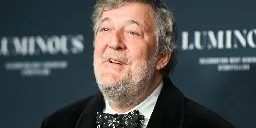Striking actor Stephen Fry says his voice was stolen from the Harry Potter audiobooks and replicated by AI
Striking actor Stephen Fry says his voice was stolen from the Harry Potter audiobooks and replicated by AI

fortune.com
Striking actor Stephen Fry says his voice was stolen from the Harry Potter audiobooks and replicated by AI

The actor told an audience in London that AI was a “burning issue” for actors.
